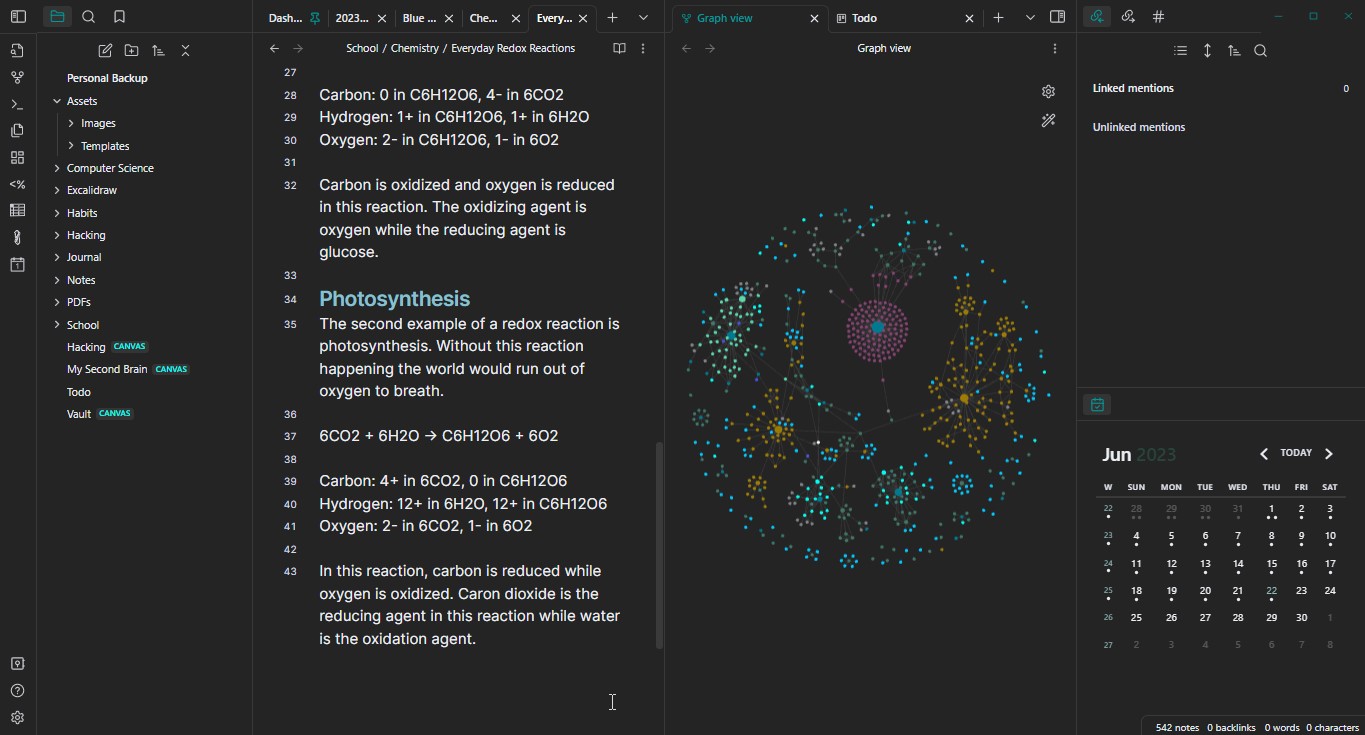We absorb tons of information. We each have unique ideas. (I truly believe this, that everybody has clever little notions and revelations.) But we don't put them to paper. For the most part, it's because we are never asked to pull these back up. We don't need them once the moment has passed. But if you're in school, in the field of research, or just interested in writing about interesting things, you do need to pull these back up. I'm all three of these. In school we're basically taught to keep a list of what we read about for any given project and turn it into a works cited. This is weak. It does nothing for us after the project has ended. We could be storing all this information and using it to our advantage!
Enter the Zettelkasten knowledge network. At it's core, it's three simple pieces. One: keep notes on everything you read and store them in a database. Two: keep notes on all the little ideas you have and put them in there two. Three: draw lines between these notes. It's something of a fad, and these days the big player in the Zettelkasten game is Obsidian. This program makes each of your notes into a simple .txt file with Markdown formatting and lets you link them together and do all kinds of cool stuff. It's got a great community of people sharing advice and building powerful plugins to shape the way you use the program.
I jumped on the Obsidian train a few years ago, but I didn't stay on for long. I wasn't motivated to keep up with it. I had one Obsidian vault for this Zettelkasten, one for my fiction writing, and one for a personal introspective project. I flitted between these for a while, putting most of the effort into the latter two. Now, with me starting up this blog and returning to school (for research sciences, no less!) I am inspired to come back to my Zettelkasten. I call it my Mystic Library. It's fun!
I had the idea to write a little post about "Tips for Keeping a Zettelkasten," then I checked myself. Uh, I barely know what I'm doing? Who am I to give advice? But I liked the concept, so instead of giving you tips, these are just for me! I do this a lot, actually. It's a combination of the Marcus Aurelius style of instructional, disciplinary, second-person journaling and the pedagogical concept that the best way to learn something is to teach it. I pretend to explain an idea, catch where I fall short, and fill in the gaps. It's a wonderful method of metacognition and I highly recommend it. So, to inform my future endeavors in creating my Mystic Library, I give you Five Tips for Aspiring Wizard Librarians!

Add Slowly, but Add
The goal of the Mystic Library is to form interesting connections between your ideas and resources. In order to accomplish this, you need scale. Add frequently to your Library: the more ancient tomes and wizardly treatises you have, the more expansive your magical powers will grow. But you need not worry about building the collection all at once!
For me, a good practice is to add one small reference a day while keeping up with the other works that I pursue on my own. Find a schedule that works best for you! My small references include short opinion articles, educational YouTube videos, and Wikipedia pages. I keep a few, high level notes. For longer resources like books I take a few notes for each chapter and then, in my file for that book, add a section for major takeaways from the book as a whole.
The important part is to keep building the list of references, even if it's slow. Don't get discouraged! If you read broadly, you will add a lot of references that don't link to each other right away. The more you add, the more likely you will start to form connections between these resources. "Hmm, this author seems to disagree with this one," "What I've read here contradicts what I read there! Which one is true?," "Is this concept an example of that?" You've got to not only consume the information, but keep it well recorded. In pursuit of this, consider Tip Two:
Note Always
Ideas and connections can strike you at any time. That's why it's important to always be able to take notes. Start ruminating about why you actually prefer X political candidate to Y? Note it! Sit down to watch a documentary with your friends? Note it! Unveil an arcane secret while pondering your orb? Note it! Realize a flaw in an argument you read the other day? Note it! Note it before it's gone!
Always have some ability to take notes. I strongly recommend a small physical notebook and pen, but make sure that you've also got the ability to take notes on your phone too when necessary or preferred. Keep in mind the nature of these notes: big picture, fleeting, memory joggers. Sometimes I take my notes on tiny notecards while I watch something at my computer. I make maybe five bullet points, scrap two that ended up being not so important, then add one more that better summarized the main idea of the text. When I revise and add these notes to my Library, I simply toss the index card. That's because the note-taking isn't the real work. That comes in Tip Three:

Link Everything
Link your ideas to other ideas. Link your references to other references. Link your ideas to references that support them, dispute them, or take them a step further. The links are the main work of the Mystic Library. They're what allow you to say "I need to write something about virtue ethics," type "virtue" into your search bar, and get everything you need. You'll take an idea to be your main point, find linked resources to support it, and turn linked ideas into subpoints. This mythical weave must maintain one crucial element: explain your connections. Write in the linking text why you've connected these two ideas.
This can be hard at first because you need ideas and resources worthy of connecting. You start out with exactly zero. Link liberally, knowing that you can remove ties later, but you might not find the connection again if you leave it yet untied. For this, consider Tip Four:
Don't be a Perfectionist
Do you think the great wizards of history were casting nth2 conjuration incantations when they were mere apprentices? Were the Archives of Methylexynese built overnight? Nay! Mastery takes time. When building your Mystic Library, build it in small steps. You aren't going to get the formatting for the notes and the relevant metadata for your resources right on the first try. You're not going to be able to keep things perfectly consistent. Let it be messy. Remember that you can make revisions and reorganizations later. As stated above, especially in the beginning, volume is critical. Prioritize not quantity over quality, but consider how much quality you can product with limited experience. You will grow and get better at it. Instead, prioritize Tip Five:
Have Fun
Remember your motivates for cultivating a Mystic Library. In fact, it may be wise to create a "meta note" with inspiration for your magical quest for knowledge. Further, add humor to your notes. Cultivate creative themes to make your Library pretty. Don't forget to put pragmatic pursuits first! But enjoy the work.
When adding resources, as far as possible, read only what interests you. If you are not independently motivated to consider and contemplate something, don't. Add notes that reflect your genuine attitude on information. "This idea is dumb" is a perfectly good note, as long as it explains what you're referencing and why you think that way.
Thank you for reading this blog post. I hope my ideas about writing and research where interesting to you, and that you maybe learned something new or got some inspiration yourself. If you're interested in learning more about Zettelkasten I would highly recommend the book How to Take Smart Notes by Sönke Ahrens. You can also check out multiple great YouTube channels on the subject!
Sincerely,
SunWisp